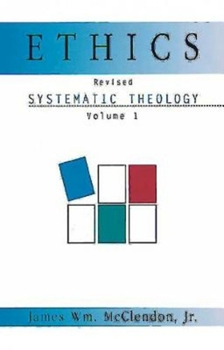Ethics: Systematic Theology Volume 1, Revised
Select Format
Select Condition 
Book Overview
When it first appeared in 1986, James McClendon's Ethics laid claim to two compelling theological ideas. First, that a highly distinctive theological perspective characterizes the inheritors of the sixteenth century's radical reformation. At the heart of this perspective is what McClendon calls the baptist vision, a way of understanding the gospel that emphasizes the church's distinction from the world, and its continuity with the church of the New Testament. Second, that because of its emphasis on the centrality of discipleship, this radical-reformation outlook insists that theology's first task is to discover and explore the shape of the church's common life as the body of Christ; hence McClendon's novel decision to begin the task of writing a systematic theology with a volume on ethics. Since its first publication, Ethics has been followed by Doctrine (1994) and Witness (2000). The completion of the overall work has brought into sharper focus many of the theological and ethical issues and concerns central to the baptist tradition. In this revised edition of Ethics, McClendon infuses his claim for the priority of ethics within the theological task with a new urgency, born of the fuller, more complete definition of the baptist vision that Doctrine and Witness have made possible. Ethics is central, he reminds us, because biblical faith rests on a set of distinctive practices that arise from our placement within a larger Christian story. In his revisions McClendon offers a more complete explanation of how the interaction of faithful practices and gospel story give rise to a way of life that is distinctively Christian.
Format:Paperback
Language:English
ISBN:0687090873
ISBN13:9780687090877
Release Date:September 2002
Publisher:Abingdon Press
Length:368 Pages
Weight:0.20 lbs.
Dimensions:0.9" x 6.1" x 9.2"
Customer Reviews
2 ratings
A MUST HAVE for theologians!
Published by Thriftbooks.com User , 16 years ago
I first read this book at Duke Divinity School in the early 90s as a graduate student. To the point: it is simply brilliant. I've used it ever since (I now teach religion at the college level). Actually, I've gone through THREE copies of this book. It's a must have for anyone seriously interested in theology, ethics, narrative theology, or even Christian spirituality. The writing is acessable and timeless --- a perfect primer that draws upon the work of Duke's Stanley Hauerwas, but goes beyond it too. And don't be fooled by the fact that it was written by a Baptist. As the other reviewer said, this is groundbreaking theology. It draws upon other disciplines and denominations, and it extends across denominational lines. McClendon's understanding of Christian forgiveness is one of the clearest and most faithful understandings in print today. I can't say enough about the depth and significance of this work. Again, it is simply brilliant!
A LANDMARK WORK IN THEOLOGICAL ETHICS
Published by Thriftbooks.com User , 25 years ago
McClendon's three-volume theology, representing a large scale revisioning of systematics, is now complete - Ethics (1986), Doctrine (1994) and Witness (2001) - exemplifying an approach that gives priority to the ecclesial community rather than the academy: not theology 'made popular' but rather self-consciously rooted in the practices of the Christian community. The most conspicuous evidence of this is the way that McClendon chose to begin his systematic theology: with ethics! ... rather than 'prolegomena', followed by 'doctrine', then 'ethics'. 'Prolegomena' usually discusses questions of method and typically in terms of philosophical justification for the subsequent theological project. Doctrine provides systematic presentation of Christian teaching often in quasi-scientific format and categories. Ethics, however, as Ron Sider says, is "often left until last and then left out" (42)! McClendon does not challenge the threefold description of the theological task but sees them representing three levels of entry (kinds of "probing") into theology. He recognises "that we begin by finding the shape of the common life in the body of Christ, which is for Christians partly a matter of self discovery, as Gregory learned from Origen. That is ethics. We continue with the investigation of the common and public teaching that sanctions and supports that common life by displaying its doctrinal height and breadth and depth. That is doctrine. And we end by discovering those apologetic and speculative positions that such life and such teaching call forth. That is philosophical theology or apologetics." (45) McClendon finds himself in the company of 'postmoderns', and so not concerned with 'first principles' or to 'start from scratch' but rather exemplifying John Yoder's alternatives to "methodologism"; namely "walk and word", ie to begin "where we are" in the midst of the story of God in Israel, Jesus and the Christian community as witnessed in Scripture. But it is almost to 'damn with faint praise' to label McClendon 'postmodern' since his earlier 'philosophical' work, _Understanding Religious Convictions_ (co-author James Smith), was in many respects ahead of its time. As he and Smith comment in their updated edition (_Convictions_), "we believe, not that we are catching up with the times, but that the times have at long last caught up with us." McClendon draws upon this earlier work, understanding theology as a "science of convictions" involving the "discovery, understanding, and transformation of the convictions of a convictional community, including the discovery and critical revision of their relation to one another and to whatever else there is." (23) This 'generic' definition admits not only forms of monotheism and polytheism but also 'atheistic' theologies and the "theoretics" of 'communities' such as Marxists. It also opens up the possibility of a new form of conversation with 'secular' interlocutors, and avoids both subjectivist and objectivist p





